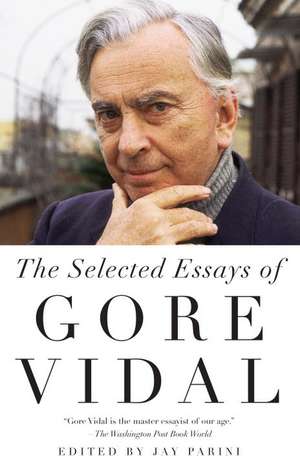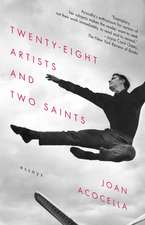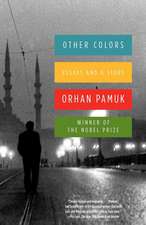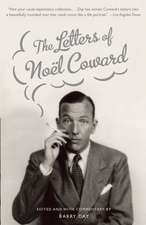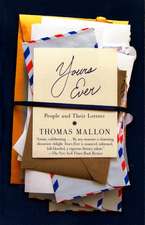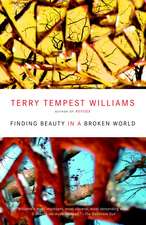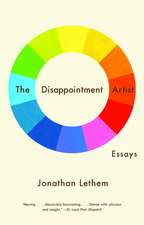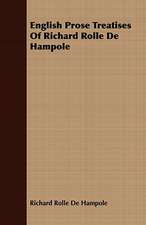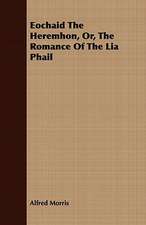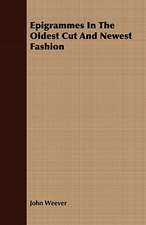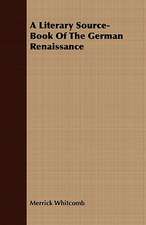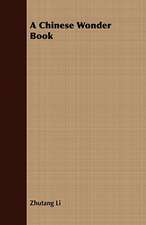The Selected Essays of Gore Vidal
Autor Gore Vidal Editat de Jay Parinien Limba Engleză Paperback – 31 mai 2009
Preț: 96.74 lei
Nou
Puncte Express: 145
Preț estimativ în valută:
18.52€ • 19.26$ • 15.49£
18.52€ • 19.26$ • 15.49£
Carte disponibilă
Livrare economică 22 februarie-08 martie
Preluare comenzi: 021 569.72.76
Specificații
ISBN-13: 9780307388681
ISBN-10: 0307388689
Pagini: 458
Dimensiuni: 134 x 203 x 27 mm
Greutate: 0.35 kg
Editura: Vintage Books USA
ISBN-10: 0307388689
Pagini: 458
Dimensiuni: 134 x 203 x 27 mm
Greutate: 0.35 kg
Editura: Vintage Books USA
Notă biografică
Gore Vidal was born in 1925 at the United States Military Academy at West Point. His first novel, Williwaw, written when he was nineteen years old and serving in the Army, appeared in the spring of 1946. Since then he has written twenty-three novels, five plays, many screenplays, short stories, well over two hundred essays, and a memoir.Jay Parini (born 1948) is an American writer and academic. Among his works of fiction and criticism are The Last Station, John Steinbeck, and Benjamin's Crossing. Parini is Gore Vidal's literary executor and a regular contributor to various journals and newspapers, including The Chronicle of Higher Education and The Guardian (U.K.). In 1976, he cofounded New England Review, and he has taught at Middlebury College since 1982. He lives in Vermont.
Extras
NOVELISTS AND CRITICS OF THE 1940s
It is a rare and lucky physician who can predict accurately at birth whether a child is to become a dwarf or a giant or an ordinary adult, since most babies look alike and the curious arrangements of chromosomes which govern stature are inscrutable and do not yield their secret order even to the shrewdest eye. Time alone gives definition. Nevertheless, interested readers and writers, like anxious parents and midwives, forever speculate upon the direction and meaning of current literary trends, and professional commentators with grave authority make analyses which the briefest interval often declares invalid. But despite their long historic record of bad guesses, bookish men continue to make judgments, and the recorded derelictions of taste and the erratic judgments of earlier times tend only to confirm in them a sense of complacency: they are not we, and did not know; we know. To disturb this complacency is occasionally worthwhile, and one way of doing it is to exhume significant critical texts from the recent past. Those of the last century, in particular, provide us with fine warnings.
For instance: “We do not believe any good end is to be effected by fictions which fill the mind with details of imaginary vice and distress and crime, or which teach it instead of endeavoring after the fulfillment of simple and ordinary duty to aim at the assurance of superiority by creating for itself fanciful and incomprehensible perplexities. Rather we believe that the effect of such fictions tends to render those who fall under their influence unfit for practical exertion by intruding on minds which ought to be guarded from impurity the unnecessary knowledge of evil.” This was the Quarterly Review on George Eliot’s The Mill on the Floss, and it is really quite well said: the perennial complaint of the professional reviewers and the governors of lending libraries (“enough unpleasant things in the world without reading about them in books”).
Or the following attack on preciosity and obscurantism (Blackwood’s Magazine, 1817): “Mr. Coleridge conceives himself to be a far greater man than the public is likely to admit; and we wish to waken him from what seems to us a most ludicrous delusion. He seems to believe that every tongue is wagging in his praise. . . . The truth is that Mr. Coleridge is but an obscure name in English literature.” [Coleridge was ?forty-five years old at this time and his major work was long since done.] “In London he is well known in literary society for his extraordinary loquacity . . .” And there follows a prolix attack upon the Biographia Literaria.
Or this excerpt from an 1848 Quarterly Review, deploring the pagan, the sexual, and the vicious:
At all events there can be no interest attached to the writer of Wuthering Heights—a novel succeeding Jane Eyre and purporting to be written by Ellis Bell—unless it were for the sake of more individual reprobation. For though there is a decided resemblance between the two, yet the aspect of the Jane and Rochester animals in their native state, as Catherine and Heatfield [sic], is too odiously and abominably pagan to be palatable even to the most vitiated class of English readers. With all the unscrupulousness of the French school of novels it combines that repulsive vulgarity in the choice of its vice which supplies its own antidote.
Differently worded, these complaints still sound in our press. The Luce editors who cry for an “affirmative” literature echo voices once raised against George Eliot. When middlebrow reviewers deplore “morbidity” in our best writers, they only paraphrase the outrage of those who found the Brontës repellent. And the twitterings of an Orville Prescott when he has discovered a nice and busy book echo the same homely song of those long-dead reviewers who found in the three-volume novels of forgotten lady writers so much warm comfort.
As the essential problems of life remain the same from generation to generation, despite altered conditions, so the problems of literary recognition remain, for contemporaries, peculiarly difficult. Despite the warnings of other times, the impetuous and the confident continue their indiscriminate cultivation of weeds at the expense of occasional flowers.
To consider the writing of any period, including the present, it is perhaps of some importance to examine the climate in which the work is done, to chart if possible the prevailing winds, the weather of the day.
Today there is a significant distinction between the reviewers for popular newspapers and magazines, whom no one interested in literature reads, and the serious critics of the Academy, who write for one another in the quarterlies and, occasionally, for the public in the Sunday supplements. The reviewers are not sufficiently relevant or important to be considered in any but a social sense: they reflect the commonest prejudices and aspirations of the middle class for whom they write, and they need not concern us here.
The critics, however, are significant. They are dedicated men; they are serious; their learning is often respectable. They have turned to the analysis of literature with the same intensity that, born in an earlier time, they might have brought to formal philosophy, to the law, to the ministry. They tend, generically and inevitably, to be absolutists. They believe that by a close examination of “the text,” the laws and the crafty “strategies” of its composition will be made clear and the findings will provide “touchstones” for a comparative criticism of other works. So far so good. They have constructed some ingenious and perhaps valuable analyses of metaphysical verse whose order is often precise and whose most disparate images proceed with a calculable wit and logic.
Unfortunately, the novel is not so easily explicated. It is a loose form, and although there is an inherent logic in those books we are accustomed to call great, the deducible “laws” which governed the execution of Emma are not going to be of much use in defining The Idiot. The best that a serious analyst can hope to do is comment intelligently from his vantage point in time on the way a work appears to him in a contemporary, a comparative, or a historic light; in which case, his opinion is no more valuable than his own subtlety and knowledge. He must be, as T. S. Eliot put it so demurely, “very intelligent.” The point, finally, is that he is not an empiricist dealing with measurable quantities and calculable powers. Rather, he is a man dealing with the private vision of another, with a substance as elusive and amorphous as life itself. To pretend that there are absolutes is necessary in making relative judgments (Faulkner writes better than Taylor Caldwell), but to believe that there are absolutes and to order one’s judgments accordingly is folly and disastrous. One is reminded of Matthew Arnold and his touchstones; it was his conviction that certain lines from a poet by all conceded great might be compared to those of lesser poets to determine their value. Arnold selected Dante as his great poet, an irreproachable choice, but then he misread the Italian, which naturally caused some confusion. Arnold’s heirs also demand order, tidiness, labels, ultimate assurance that this work is “good” and that work is “bad,” but sooner or later someone misreads the Italian and the system breaks down. In our time there are nearly as many critical systems as there are major critics, which is a pleasing anarchy. The “new critics,” as they have been termed (they at least dislike being labeled and few will now answer when called), are fundamentally mechanics. They go about dismantling the text with the same rapture that their simpler brothers experience while taking apart combustion engines: inveterate tinkerers both, solemnly playing with what has been invented by others for use, not analysis.
Today’s quarterlies are largely house organs for the academic world. They seldom publish imaginative work and one of their most distinguished editors has declared himself more interested in commentaries on writing than in the writing itself. Their quarrels and schisms and heresies do not in the least resemble the Alexandrians whom they occasionally mention, with involuted pride, as spiritual ancestors. Rather, one is reminded of the semantic and doctrinal quarrels of the church fathers in the fourth century, when a diphthong was able to break the civilized world in half and spin civilization into nearly a millennium of darkness. One could invent a most agreeable game of drawing analogies between the fourth century and today. F. R. Leavis and Saint Jerome are perfectly matched, while John Chrysostom and John Crowe Ransom suggest a possibility. The analogy works amusingly on all levels save one: the church fathers had a Christ to provide them with a primary source of revelation, while our own dogmatists must depend either upon private systems or else upon those proposed by such slender reeds as Matthew Arnold and T. S. Eliot, each, despite his genius, a ritual victim as well as a hero of literary fashion.
But the critics are indefatigable and their game is in earnest, for it is deeply involved not only with literature but with such concrete things as careers in the Academy, where frequent and prestigious publication is important. Yet for all their busyness they are by no means eclectic. In a Henry James year not one will write an analysis of George Meredith. They tend to ignore the contemporary writers, not advancing much later than F. Scott Fitzgerald, whose chief attraction is that he exploded before he could be great, providing a grim lesson in failure that, in its completeness, must be awfully heartening when contemplated on the safe green campus of some secluded school.
Of the critics today, Edmund Wilson, the most interesting and the most important, has shown virtually no interest in the writing of the last fifteen years, his talents engaged elsewhere in the construction of heroic sepulchers for old friends like Fitzgerald and Millay, a likable loyalty but a not entirely useful one. He can of course still make a fine point during a Peacock flurry and he has been startling brilliant in recent essays on Grant and Lincoln, but one can search the pages of that book of his which he calls a “Literary Chronicle of the Forties” without coming upon any but the most cursory mention of the decade’s chief talents.
Malcolm Cowley, a good professional literary man, had some sharp things to say recently about the young writers. Although he made almost no reference to the better writing of the day, he did say some accurate things about the university-trained writers, whose work, he feels, is done with too reverent an eye upon their old teachers, the new critics. Cowley speaks out for a hearty freedom from university influence, citing his own generation (the men of the 1920s are loyal to their time if not to one another: everyone was a genius then, and liquor was cheap abroad) as being singularly independent of formal instruction. Yet McCullers, Bowles, Capote, etc. (like Hemingway, Faulkner, O’Neill, etc.) are not graduates of universities, and many of the other young lions have had enough war to wash them clean of academicism. Mr. Cowley, like most commentators, tends to bend whatever he finds to his premise. To him there is no single genius who can set the tone for a generation but one wonders if he would recognize that great writer any more than Lord Jeffrey, a century ago, was able to recognize his time’s greatness? For the Cowleys, the novel stopped at Gatsby. That Carson McCullers (whom he does not mention) has influenced many works, that Tennessee Williams has influenced the theater of the world, that Paul Bowles, among others, has reshaped the short story—none of these things impinges on him.
Mr. Cowley’s gloom is supported by the young John W. Aldridge, Jr. In his amusing novel After the Lost Generation he got onto the subject of “values” (by way of Lionel Trilling and perhaps V. S. Pritchett). After discussing a number of fictitious characters who were writing books (using real, if unlikely, names like Truman Capote and Gore Vidal), he “proved,” by the evidence of their works, that they had all failed of greatness because, except for “a pocket or two of manners” (the Army; the South; here and there in New England), there was really nothing left to write about, none of that social conflict out of which comes art, like sparks from a stone grinding metal. His coda indicated that a young writer of singular genius is at this moment hovering in the wings awaiting his cue. It will be interesting to read Mr. Aldridge’s next novel.
Yet Mr. Aldridge does have a case: the old authority of church, of settled Puritan morality, has broken down, and if one’s vision is historically limited to only a few generations in time it might seem that today’s novelists are not having the fun their predecessors in the 1920s had, breaking cultural furniture. But to take a longer view, one must recall that the great times for literature and life were those of transition: from the Middle Ages to modern times by way of the Renaissance, from dying paganism to militant Christianity by way of the Antonines, and so on back to Aristophanes. The opportunity for the novelist when Mr. Aldridge’s “values” are in the discard is fabulous: to create without wasting one’s substance in political or social opposition. What could be more marvelous! Neither Virgil nor Shakespeare had to attack their day’s morality or those in authority. They were morally free to write of life, of Henry James’s “the main thing.” There were certainly inequities and barbarities in sixteenth-century England and first-century Rome, but the writers, affected partly by convention (not to mention the Star Chamber), did not address themselves to attacks upon the government or the time’s morality, which, apparently, did not obsess them. Writers, after all, are valuable in spite of their neuroses, obsessions, and rebellions, not because of them. It is a poor period indeed which must assess its men of letters in terms of their opposition to their society. Opposition to life’s essential conditions perhaps, or to death’s implacable tyranny, is something else again, and universal; but novels, no matter how clever, which attempt to change statutes or moral attitudes are, though useful at the moment, not literature at all. In fact, if Mr. Aldridge were right in his proposition we would have not a barren, “subjectless” world for literature but the exact opposite: a time of flowering, of creation without waste and irrelevancy. Unhappily, American society has not changed that much in the last thirty years. There is as much to satirize, as much to protest as ever before, and it will always be the task of the secondary figures to create those useful public books whose momentary effect is as stunning as their literary value is not.
It is a rare and lucky physician who can predict accurately at birth whether a child is to become a dwarf or a giant or an ordinary adult, since most babies look alike and the curious arrangements of chromosomes which govern stature are inscrutable and do not yield their secret order even to the shrewdest eye. Time alone gives definition. Nevertheless, interested readers and writers, like anxious parents and midwives, forever speculate upon the direction and meaning of current literary trends, and professional commentators with grave authority make analyses which the briefest interval often declares invalid. But despite their long historic record of bad guesses, bookish men continue to make judgments, and the recorded derelictions of taste and the erratic judgments of earlier times tend only to confirm in them a sense of complacency: they are not we, and did not know; we know. To disturb this complacency is occasionally worthwhile, and one way of doing it is to exhume significant critical texts from the recent past. Those of the last century, in particular, provide us with fine warnings.
For instance: “We do not believe any good end is to be effected by fictions which fill the mind with details of imaginary vice and distress and crime, or which teach it instead of endeavoring after the fulfillment of simple and ordinary duty to aim at the assurance of superiority by creating for itself fanciful and incomprehensible perplexities. Rather we believe that the effect of such fictions tends to render those who fall under their influence unfit for practical exertion by intruding on minds which ought to be guarded from impurity the unnecessary knowledge of evil.” This was the Quarterly Review on George Eliot’s The Mill on the Floss, and it is really quite well said: the perennial complaint of the professional reviewers and the governors of lending libraries (“enough unpleasant things in the world without reading about them in books”).
Or the following attack on preciosity and obscurantism (Blackwood’s Magazine, 1817): “Mr. Coleridge conceives himself to be a far greater man than the public is likely to admit; and we wish to waken him from what seems to us a most ludicrous delusion. He seems to believe that every tongue is wagging in his praise. . . . The truth is that Mr. Coleridge is but an obscure name in English literature.” [Coleridge was ?forty-five years old at this time and his major work was long since done.] “In London he is well known in literary society for his extraordinary loquacity . . .” And there follows a prolix attack upon the Biographia Literaria.
Or this excerpt from an 1848 Quarterly Review, deploring the pagan, the sexual, and the vicious:
At all events there can be no interest attached to the writer of Wuthering Heights—a novel succeeding Jane Eyre and purporting to be written by Ellis Bell—unless it were for the sake of more individual reprobation. For though there is a decided resemblance between the two, yet the aspect of the Jane and Rochester animals in their native state, as Catherine and Heatfield [sic], is too odiously and abominably pagan to be palatable even to the most vitiated class of English readers. With all the unscrupulousness of the French school of novels it combines that repulsive vulgarity in the choice of its vice which supplies its own antidote.
Differently worded, these complaints still sound in our press. The Luce editors who cry for an “affirmative” literature echo voices once raised against George Eliot. When middlebrow reviewers deplore “morbidity” in our best writers, they only paraphrase the outrage of those who found the Brontës repellent. And the twitterings of an Orville Prescott when he has discovered a nice and busy book echo the same homely song of those long-dead reviewers who found in the three-volume novels of forgotten lady writers so much warm comfort.
As the essential problems of life remain the same from generation to generation, despite altered conditions, so the problems of literary recognition remain, for contemporaries, peculiarly difficult. Despite the warnings of other times, the impetuous and the confident continue their indiscriminate cultivation of weeds at the expense of occasional flowers.
To consider the writing of any period, including the present, it is perhaps of some importance to examine the climate in which the work is done, to chart if possible the prevailing winds, the weather of the day.
Today there is a significant distinction between the reviewers for popular newspapers and magazines, whom no one interested in literature reads, and the serious critics of the Academy, who write for one another in the quarterlies and, occasionally, for the public in the Sunday supplements. The reviewers are not sufficiently relevant or important to be considered in any but a social sense: they reflect the commonest prejudices and aspirations of the middle class for whom they write, and they need not concern us here.
The critics, however, are significant. They are dedicated men; they are serious; their learning is often respectable. They have turned to the analysis of literature with the same intensity that, born in an earlier time, they might have brought to formal philosophy, to the law, to the ministry. They tend, generically and inevitably, to be absolutists. They believe that by a close examination of “the text,” the laws and the crafty “strategies” of its composition will be made clear and the findings will provide “touchstones” for a comparative criticism of other works. So far so good. They have constructed some ingenious and perhaps valuable analyses of metaphysical verse whose order is often precise and whose most disparate images proceed with a calculable wit and logic.
Unfortunately, the novel is not so easily explicated. It is a loose form, and although there is an inherent logic in those books we are accustomed to call great, the deducible “laws” which governed the execution of Emma are not going to be of much use in defining The Idiot. The best that a serious analyst can hope to do is comment intelligently from his vantage point in time on the way a work appears to him in a contemporary, a comparative, or a historic light; in which case, his opinion is no more valuable than his own subtlety and knowledge. He must be, as T. S. Eliot put it so demurely, “very intelligent.” The point, finally, is that he is not an empiricist dealing with measurable quantities and calculable powers. Rather, he is a man dealing with the private vision of another, with a substance as elusive and amorphous as life itself. To pretend that there are absolutes is necessary in making relative judgments (Faulkner writes better than Taylor Caldwell), but to believe that there are absolutes and to order one’s judgments accordingly is folly and disastrous. One is reminded of Matthew Arnold and his touchstones; it was his conviction that certain lines from a poet by all conceded great might be compared to those of lesser poets to determine their value. Arnold selected Dante as his great poet, an irreproachable choice, but then he misread the Italian, which naturally caused some confusion. Arnold’s heirs also demand order, tidiness, labels, ultimate assurance that this work is “good” and that work is “bad,” but sooner or later someone misreads the Italian and the system breaks down. In our time there are nearly as many critical systems as there are major critics, which is a pleasing anarchy. The “new critics,” as they have been termed (they at least dislike being labeled and few will now answer when called), are fundamentally mechanics. They go about dismantling the text with the same rapture that their simpler brothers experience while taking apart combustion engines: inveterate tinkerers both, solemnly playing with what has been invented by others for use, not analysis.
Today’s quarterlies are largely house organs for the academic world. They seldom publish imaginative work and one of their most distinguished editors has declared himself more interested in commentaries on writing than in the writing itself. Their quarrels and schisms and heresies do not in the least resemble the Alexandrians whom they occasionally mention, with involuted pride, as spiritual ancestors. Rather, one is reminded of the semantic and doctrinal quarrels of the church fathers in the fourth century, when a diphthong was able to break the civilized world in half and spin civilization into nearly a millennium of darkness. One could invent a most agreeable game of drawing analogies between the fourth century and today. F. R. Leavis and Saint Jerome are perfectly matched, while John Chrysostom and John Crowe Ransom suggest a possibility. The analogy works amusingly on all levels save one: the church fathers had a Christ to provide them with a primary source of revelation, while our own dogmatists must depend either upon private systems or else upon those proposed by such slender reeds as Matthew Arnold and T. S. Eliot, each, despite his genius, a ritual victim as well as a hero of literary fashion.
But the critics are indefatigable and their game is in earnest, for it is deeply involved not only with literature but with such concrete things as careers in the Academy, where frequent and prestigious publication is important. Yet for all their busyness they are by no means eclectic. In a Henry James year not one will write an analysis of George Meredith. They tend to ignore the contemporary writers, not advancing much later than F. Scott Fitzgerald, whose chief attraction is that he exploded before he could be great, providing a grim lesson in failure that, in its completeness, must be awfully heartening when contemplated on the safe green campus of some secluded school.
Of the critics today, Edmund Wilson, the most interesting and the most important, has shown virtually no interest in the writing of the last fifteen years, his talents engaged elsewhere in the construction of heroic sepulchers for old friends like Fitzgerald and Millay, a likable loyalty but a not entirely useful one. He can of course still make a fine point during a Peacock flurry and he has been startling brilliant in recent essays on Grant and Lincoln, but one can search the pages of that book of his which he calls a “Literary Chronicle of the Forties” without coming upon any but the most cursory mention of the decade’s chief talents.
Malcolm Cowley, a good professional literary man, had some sharp things to say recently about the young writers. Although he made almost no reference to the better writing of the day, he did say some accurate things about the university-trained writers, whose work, he feels, is done with too reverent an eye upon their old teachers, the new critics. Cowley speaks out for a hearty freedom from university influence, citing his own generation (the men of the 1920s are loyal to their time if not to one another: everyone was a genius then, and liquor was cheap abroad) as being singularly independent of formal instruction. Yet McCullers, Bowles, Capote, etc. (like Hemingway, Faulkner, O’Neill, etc.) are not graduates of universities, and many of the other young lions have had enough war to wash them clean of academicism. Mr. Cowley, like most commentators, tends to bend whatever he finds to his premise. To him there is no single genius who can set the tone for a generation but one wonders if he would recognize that great writer any more than Lord Jeffrey, a century ago, was able to recognize his time’s greatness? For the Cowleys, the novel stopped at Gatsby. That Carson McCullers (whom he does not mention) has influenced many works, that Tennessee Williams has influenced the theater of the world, that Paul Bowles, among others, has reshaped the short story—none of these things impinges on him.
Mr. Cowley’s gloom is supported by the young John W. Aldridge, Jr. In his amusing novel After the Lost Generation he got onto the subject of “values” (by way of Lionel Trilling and perhaps V. S. Pritchett). After discussing a number of fictitious characters who were writing books (using real, if unlikely, names like Truman Capote and Gore Vidal), he “proved,” by the evidence of their works, that they had all failed of greatness because, except for “a pocket or two of manners” (the Army; the South; here and there in New England), there was really nothing left to write about, none of that social conflict out of which comes art, like sparks from a stone grinding metal. His coda indicated that a young writer of singular genius is at this moment hovering in the wings awaiting his cue. It will be interesting to read Mr. Aldridge’s next novel.
Yet Mr. Aldridge does have a case: the old authority of church, of settled Puritan morality, has broken down, and if one’s vision is historically limited to only a few generations in time it might seem that today’s novelists are not having the fun their predecessors in the 1920s had, breaking cultural furniture. But to take a longer view, one must recall that the great times for literature and life were those of transition: from the Middle Ages to modern times by way of the Renaissance, from dying paganism to militant Christianity by way of the Antonines, and so on back to Aristophanes. The opportunity for the novelist when Mr. Aldridge’s “values” are in the discard is fabulous: to create without wasting one’s substance in political or social opposition. What could be more marvelous! Neither Virgil nor Shakespeare had to attack their day’s morality or those in authority. They were morally free to write of life, of Henry James’s “the main thing.” There were certainly inequities and barbarities in sixteenth-century England and first-century Rome, but the writers, affected partly by convention (not to mention the Star Chamber), did not address themselves to attacks upon the government or the time’s morality, which, apparently, did not obsess them. Writers, after all, are valuable in spite of their neuroses, obsessions, and rebellions, not because of them. It is a poor period indeed which must assess its men of letters in terms of their opposition to their society. Opposition to life’s essential conditions perhaps, or to death’s implacable tyranny, is something else again, and universal; but novels, no matter how clever, which attempt to change statutes or moral attitudes are, though useful at the moment, not literature at all. In fact, if Mr. Aldridge were right in his proposition we would have not a barren, “subjectless” world for literature but the exact opposite: a time of flowering, of creation without waste and irrelevancy. Unhappily, American society has not changed that much in the last thirty years. There is as much to satirize, as much to protest as ever before, and it will always be the task of the secondary figures to create those useful public books whose momentary effect is as stunning as their literary value is not.
Recenzii
“Gore Vidal is the master essayist of our age.” —The Washington Post Book World“Vidal is the best all-around American man of letters since Edmund Wilson.” —Newsweek “Wonderfully selected. . . . All classic Vidal essays are here. . . . [They] confirm Vidal's stature.” —The Buffalo News“Gore Vidal, essayist; so good that we cannot do without him. He is a treasure of the state.” —R.W.B. Lewis, The New York Times Book Review“Fearlessness and independence of mind are the strengths in this author’s arms, but his heart’s love is language and the richness of language.”—Los Angeles Times Book Review
Cuprins
Introduction by Jay Parini
PART ONE: READING THE WRITERS
Novelists and Critics of the 1940s (1953)
Tarzan Revisited (1963)
The Top Ten Best-Sellers According to the Sunday: New York Times as of January 7, 1973 (1973)
French Letters: Theories of the New Novel (1967)
American Plastic: The Matter of Fiction (1974)
Calvino's Novels (1974)
The Hacks of Academe (1976)
Some Memories of the Glorious Bird and an Earlier Self (1976)
Edmund Wilson: This Critic and This Gin and These Shoes (1980)
William Dean Howells (1983)
Dawn Powell: The American Writer (1987)
Montaigne (1992)
Rabbit's Own Burrow (1996)
PART TWO: READING THE WORLD
Passage to Egypt (1963)
Pornography (1966)
The Holy Family (1967)
Homage to Daniel Shays (1972)
Pink Triangle and Yellow Star (1981)
Theodore Roosevelt: An American Sissy (1981)
The Second American Revolution (1981)
The National Security State (1988)
Monotheism and Its Dicontents (1992)
Black Tuesday (2002)
State of the Union, (2004)
PART ONE: READING THE WRITERS
Novelists and Critics of the 1940s (1953)
Tarzan Revisited (1963)
The Top Ten Best-Sellers According to the Sunday: New York Times as of January 7, 1973 (1973)
French Letters: Theories of the New Novel (1967)
American Plastic: The Matter of Fiction (1974)
Calvino's Novels (1974)
The Hacks of Academe (1976)
Some Memories of the Glorious Bird and an Earlier Self (1976)
Edmund Wilson: This Critic and This Gin and These Shoes (1980)
William Dean Howells (1983)
Dawn Powell: The American Writer (1987)
Montaigne (1992)
Rabbit's Own Burrow (1996)
PART TWO: READING THE WORLD
Passage to Egypt (1963)
Pornography (1966)
The Holy Family (1967)
Homage to Daniel Shays (1972)
Pink Triangle and Yellow Star (1981)
Theodore Roosevelt: An American Sissy (1981)
The Second American Revolution (1981)
The National Security State (1988)
Monotheism and Its Dicontents (1992)
Black Tuesday (2002)
State of the Union, (2004)
